Page and Paulus' Revival of 1776 Offers a New Perspective on The Birth Of A Nation
'Stirring and Stunning' Revival Offers 'Uniquely Powerful and Awesomely Emotional' Night at The Theatre
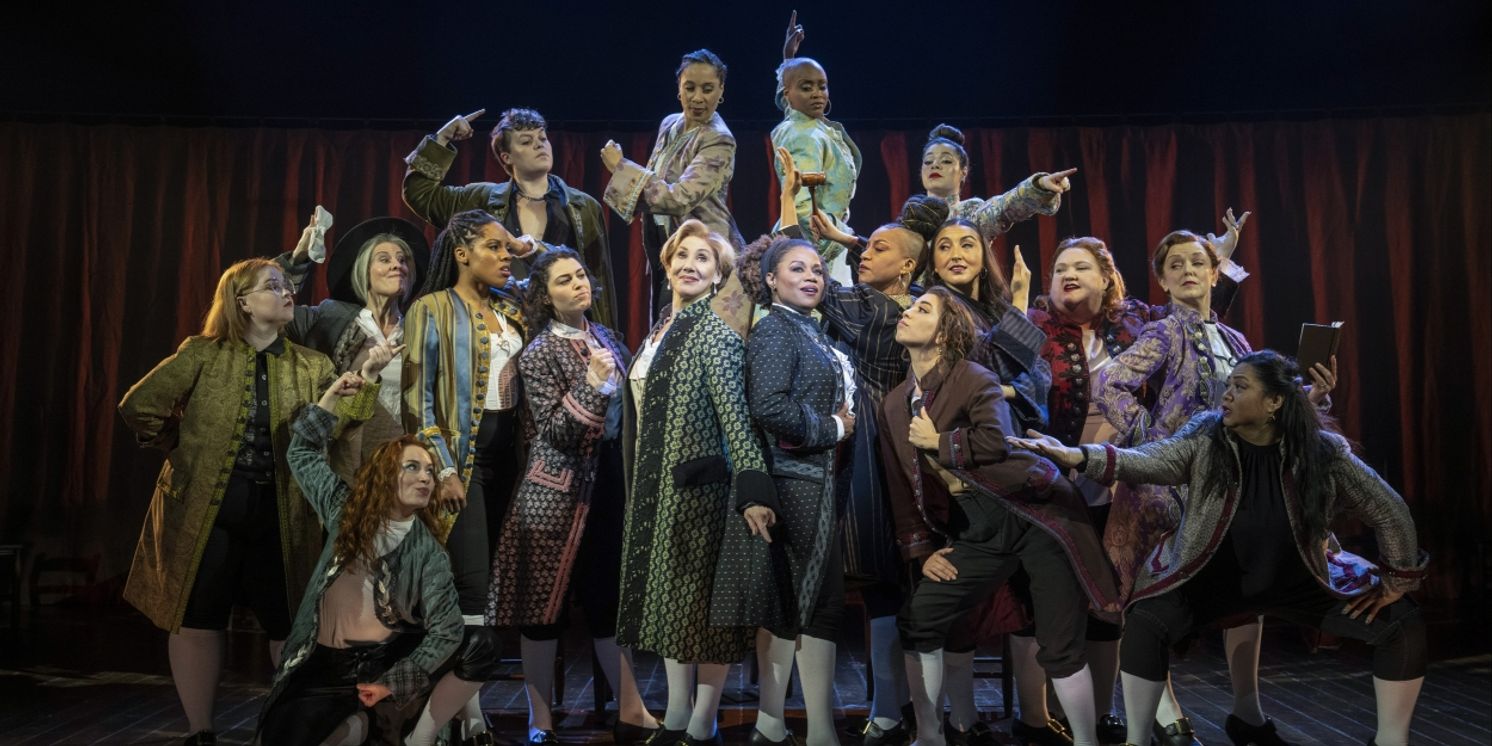
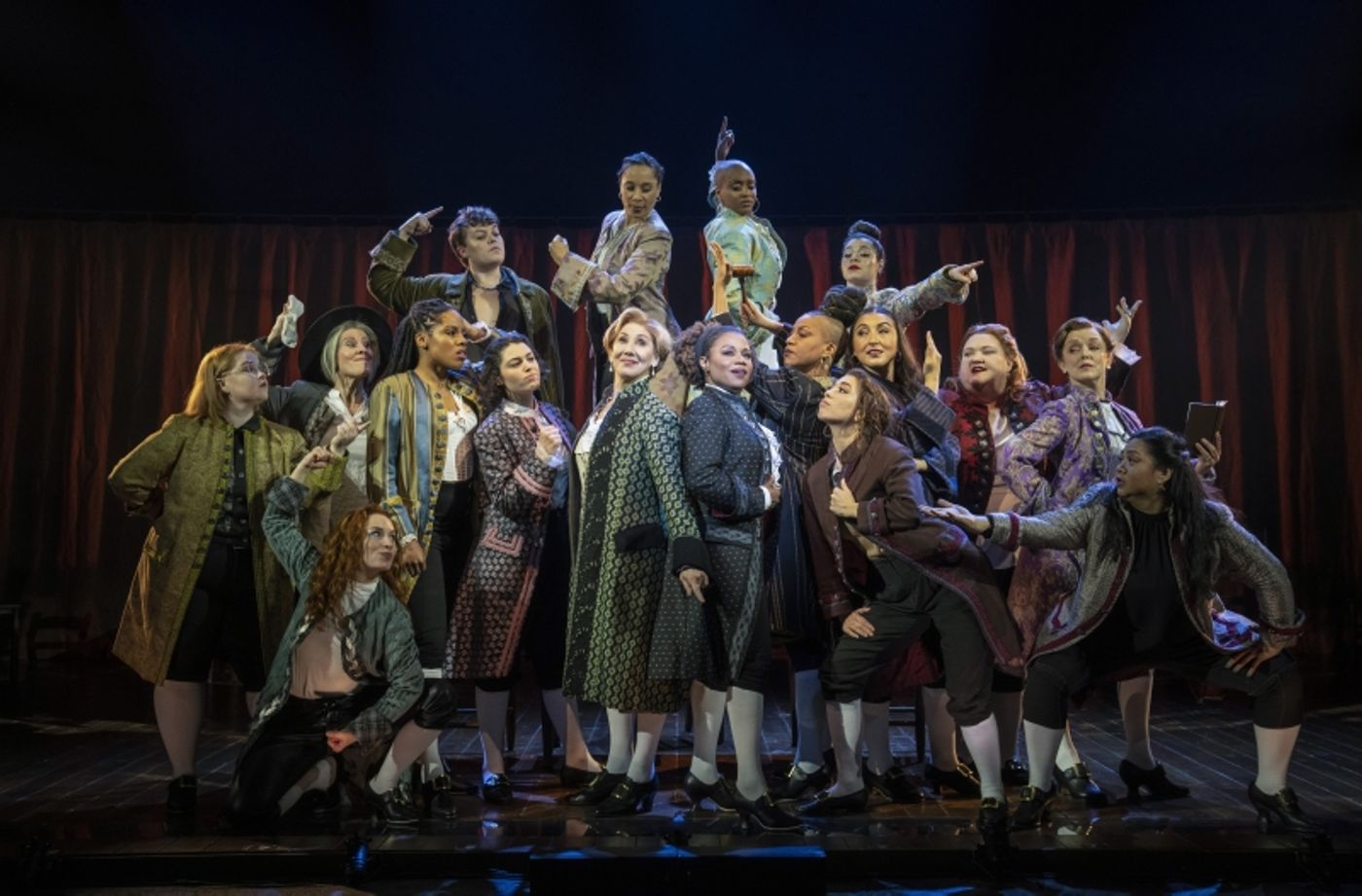
- photos by Joan Marcus
In a TPAC at Broadway season that opened with the return of Hamilton to Andrew Jackson Hall and concludes this week with the somewhat controversial revival of 1776, and what with the current tenor of times in this country, Nashville audiences have had a lot to consider insofar as political discourse and the uniquely American view of democracy, independence and freedom of thought are concerned. Whether it was by design or by happenstance, the touring companies visiting Nashville have ensured that theater-goers have had their preconceived notions challenged, their prejudices revealed and their world view altered by the theatrical works that have been a part of the 2022-23 season.
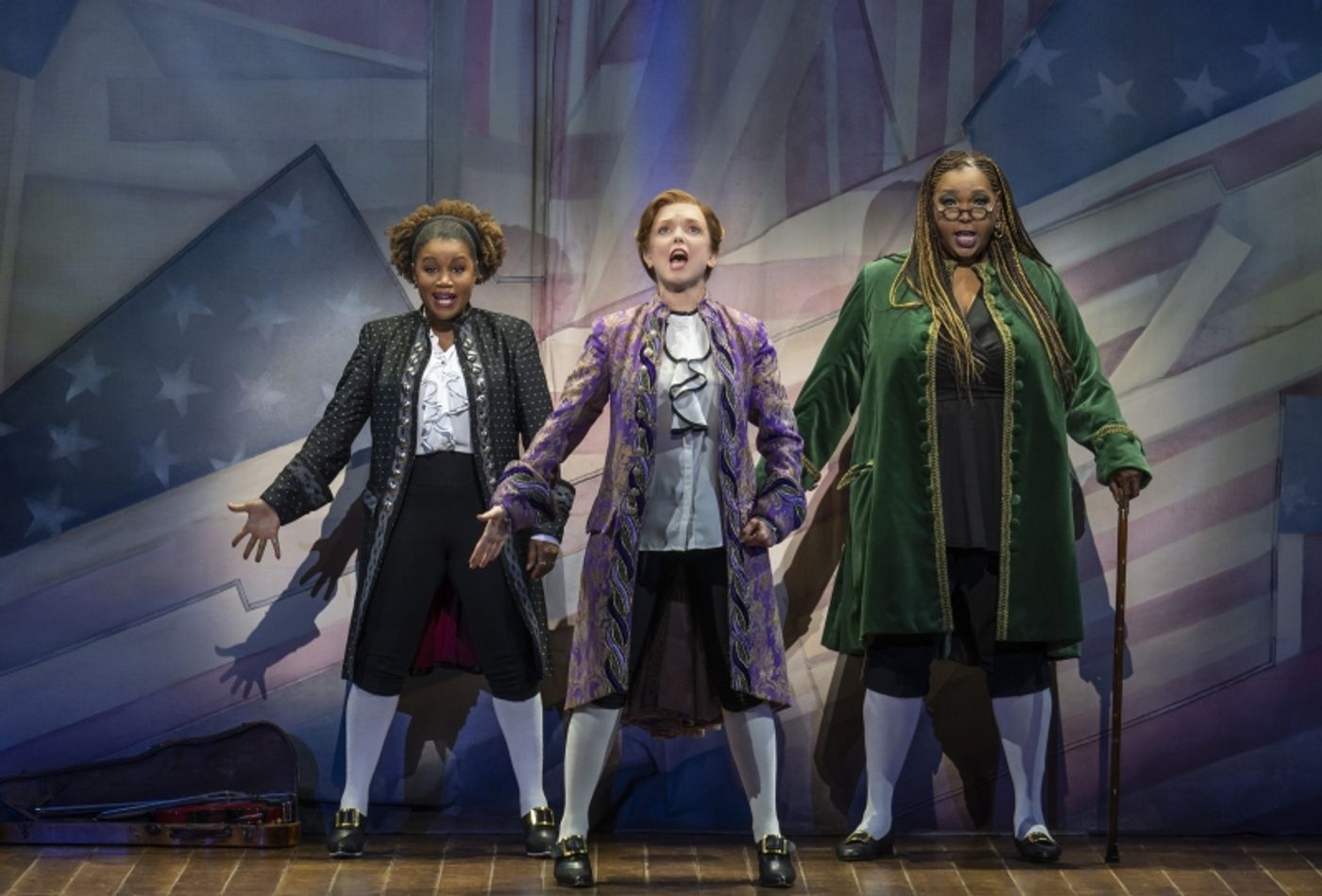
Thomas Jefferson and Liz Mikel as Benjamin Franklin.
And perhaps no production among the season’s offerings has been approached by audiences with more trepidation and abundant curiosity than director Jeffrey L. Page and Diane Paulus’ revival of 1776, the 1969 Tony Award-winning best musical that revisits the story of our nation’s birth, when representatives from the 13 American colonies rebelled against King George III and declared themselves a free and independent nation. Although its all-too-brief Broadway run might suggest otherwise, the show that bowed on the Nashville stage Tuesday night seems an altogether worthy successor to the original, much to the delight of the audience.
My rather simplistic take on this “unique experiment”? Imagine walking into Jackson Hall on opening night, as I did, thinking, “Why did the directors reimagine this pleasant, if somewhat plodding, old-school musical with an ensemble of multi-ethnic women, trans and non-binary actors cast in the roles of America’s founding fathers?” Then leaving the theater after the final curtain wondering, “why on earth would anyone ever feel the need to cast the roles with men?” and reveling in the fact that 1776 tapped into my heart in unexpected ways, eliciting an emotional and, I daresay, patriotic response.
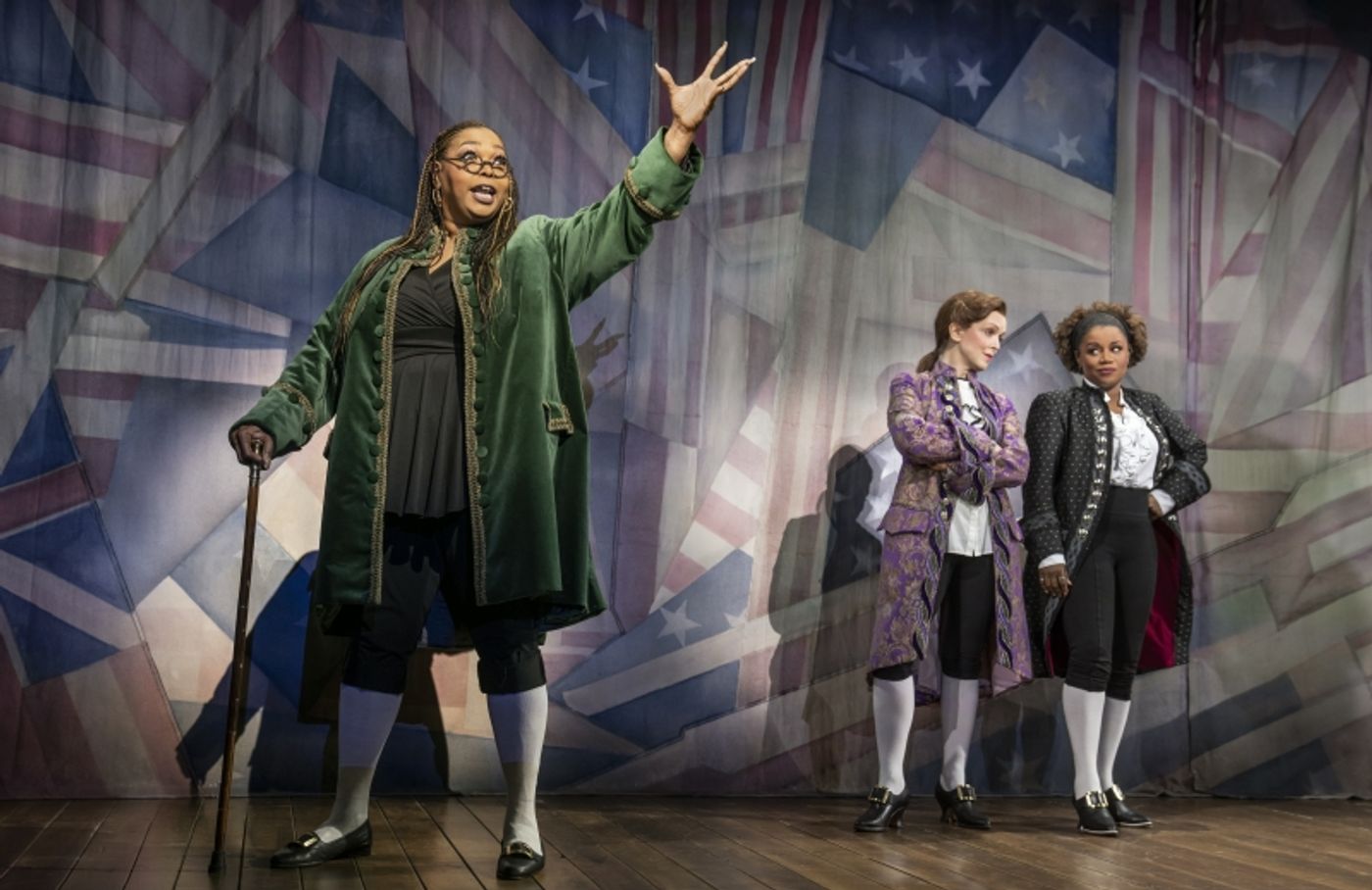
This stirring and stunning revival of 1776 is a uniquely powerful and awesomely emotional theatrical experience I have been unable to stop thinking about since the final curtain. One need only to see the brilliant staging – and feel the weighty impact – of both “Momma, Look Sharp” and “Molasses to Rum” in the musical’s second act to know this 1776 is something very special, perhaps paradigm-shifting and epoch-shattering, that devotees of musical theater must experience for themselves to fully appreciate.
The production’s strong design aesthetic allows audiences to imagine themselves among the revolutionaries charged with charting the course for American freedom from England and directors Page (he also choreographs) and Paulus have expertly cast the show with actors equal to the task of bringing historical figures to vibrant life onstage. Rather than a theatrical conceit or a staged gimmick, by employing a cast of female, non-binary and transgender performers, the creative team instead infuse the production with a certain sense of elan - no, rebelliousness - that makes the action of the play palpable and far more accessible that what may have come before.
.jpg?format=auto&width=1400)
- Joanna Glushak as John Dickinson
While some purists might grouse that the score lacks the full-bodied sound of earlier productions featuring all-male ensembles, there is absolutely no denying that the women in this revival perform the score with just as much vigor and passion, and I might argue that they produce a musical program that sounds far more lush and beautiful than I have heard before in regard to Sherman Edwards’ score. Edwards’ score is performed with equal parts passion and skill by conductor and musical director Ryan Cantwell’s superb orchestra.
Again, let me refer to “Momma, Look Sharp” – to be honest, it’s always been my favorite song from 1776 – and its stunning performance by Brooke Simpson as The Courier. Simpson’s rendition is haunting and stirring, to be certain, but the power with which she (accompanied by all the members of the ensemble, including Tiffani Barbour as McNair) brings the song to its startling climax is unlike anything I’ve experienced among iterations prior to this. Clearly, the staging of this number adds to its impact, creating a tableau of loss, loyalty, love and devotion guaranteed to leave one breathless in its wake.
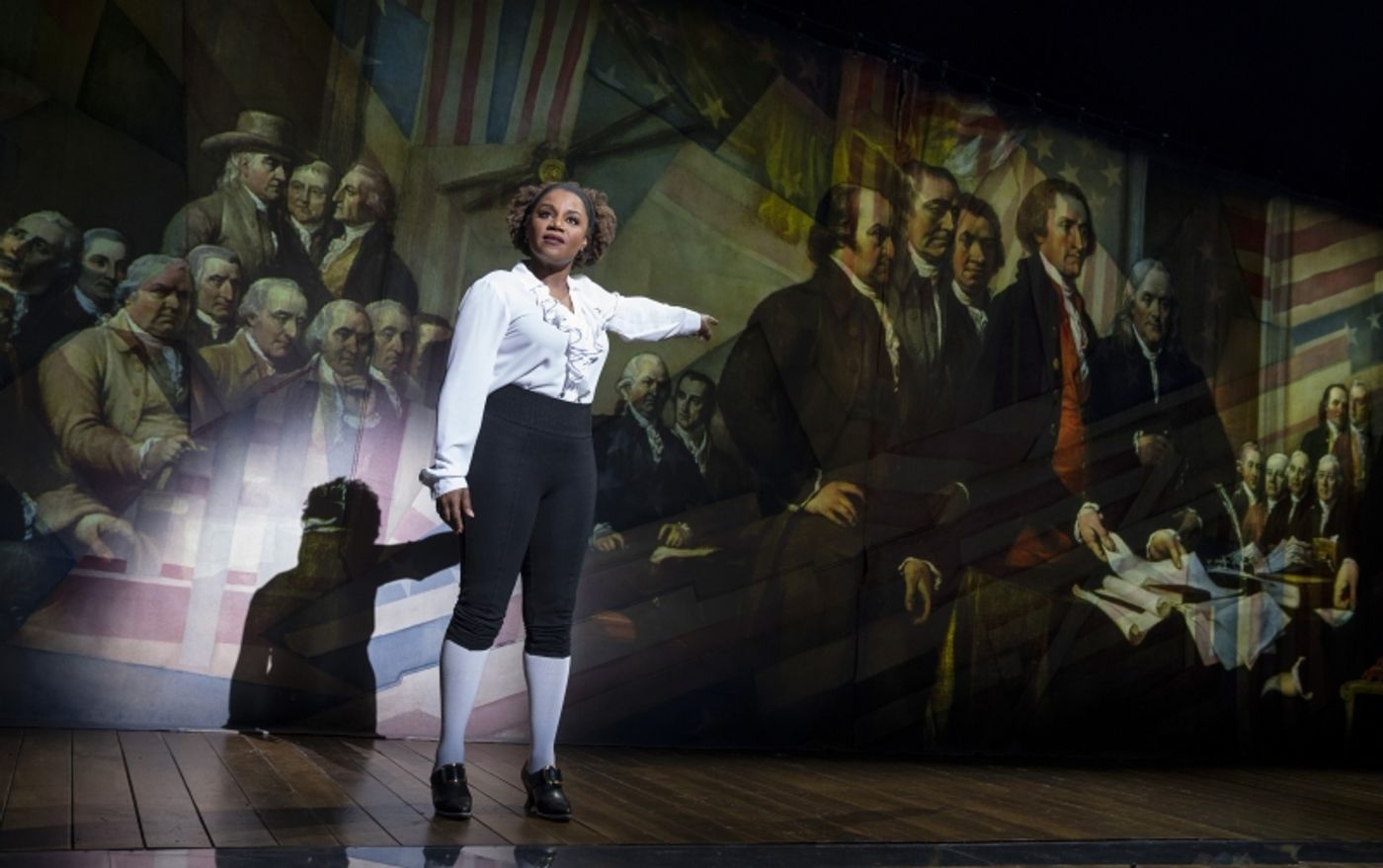
Similarly, Page’s choreography and the staging of the number creates a heretofore unequaled “Molasses to Rum,” during which the members of the Second Continental Congress debate the “peculiar institution” of slavery in the colonies and its role in the economy of the fledgling nation. Kassandra Haddock, as Edward Rutledge, leads an electrifying performance of the number that brings the incongruities of the work of the representatives fully to life onstage, and in the process challenges the audience to consider what compromises were made so that the United States of America could be born. The energy of that number alone should have audience members on the edge of their seats, eager to learn what comes next even if we stipulate that we remember what we learned in American History classes seems to pale in comparison to what actually happens onstage.
Perhaps therein lies the real power of this revival of 1776: Knowing what we know now amid the context of American history, we can’t help but shudder in disbelief of how much work still remains if every American is to realize the freedoms promised them by the Declaration of Independence. It took another 87 years for the Emancipation Proclamation to be issued in 1863, some 57 years after that before women gained the right to vote in 1920, another 45 until the Voting Rights Act of 1965, and another half a century until Obergefell v. Hodges granted marriage equality to same-gender couples. And now, almost 250 years since the members of the Second Continental Congress signed the document, we are reminded daily of how precarious and precious democracy is and the importance of our duty to ensure its continued existence.
But I digress.
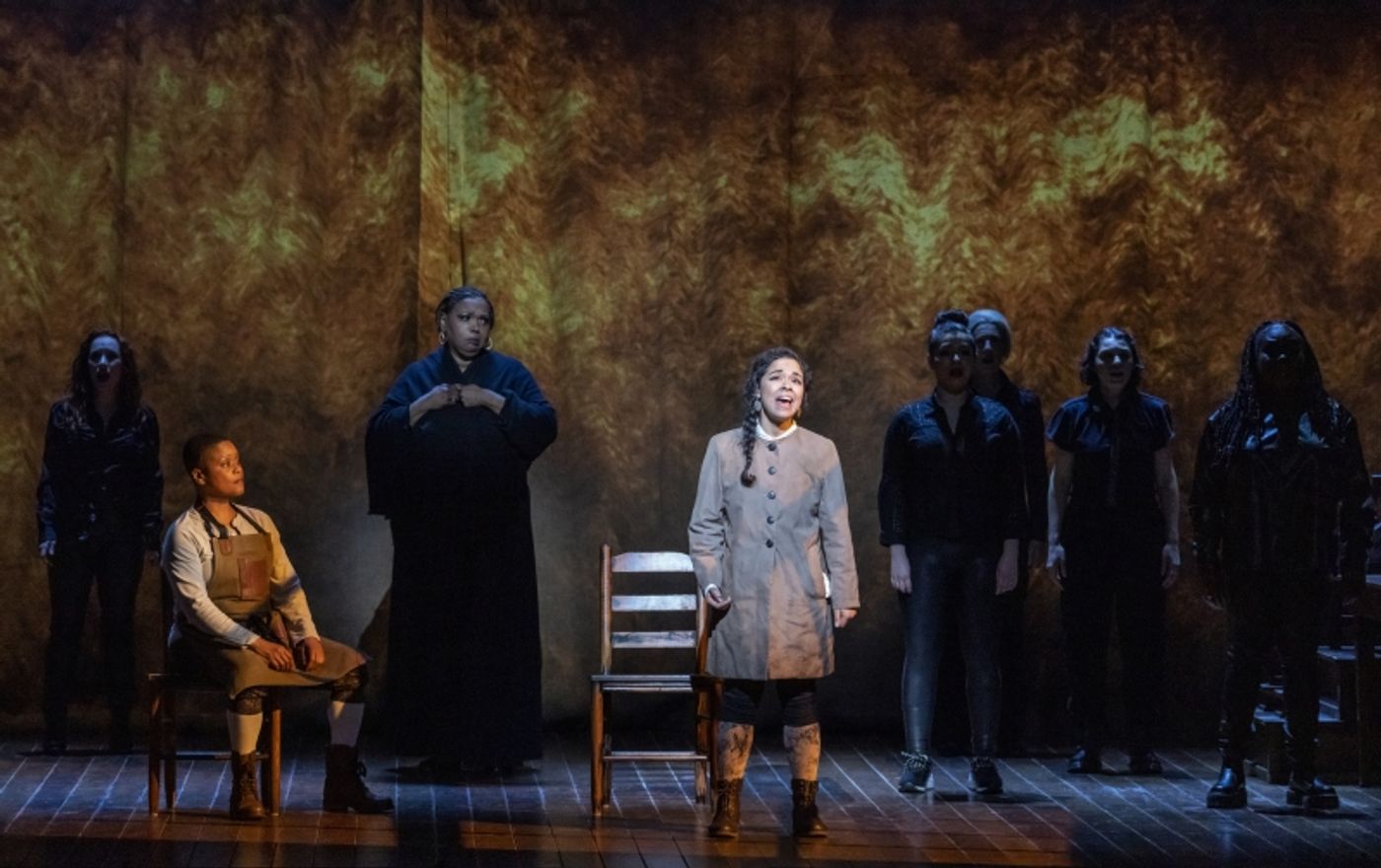
McNair and Brooke Simpson as The Courier and
the National Tour Cast of 1776.
There’s so much more than the mere retelling of history, thanks to the universality of the stories from 1776, and the very fact that this exceptional cast of artists who bring them to life add resonance and relevance to them by the very nature of who they are and what their participation represents. With the historical figures portrayed by women of every color and ethniity, by non-binary and trans artists, the promise of America seems all-encompassing and current. And if that doesn’t stir your emotions and pull at your heartstrings, I can’t imagine what might.
Page and Paulus’ ensemble of performers, which includes veterans of the show’s recent Broadway run, bring their characters to life with aplomb and finesse. Gisela Adisa is well-cast as John Adams, the verbose and overbearing Harvard-educated lawyer at the center of the tale, while Liz Mikel cuts an imposing figure as the erudite Benjamin Franklin (who is probably the most celebrated member of the Congress in 1776) and Nancy Anderson is the self-assured Thomas Jefferson, relying primarily on the beauty of words to make his points for him. Tieisha Thomas is lovely as Abigail Adams, proving her husband’s equal as confidante and helpmate (as well as Jonathan Witherspoon), while Connor Lyon’s lyric soprano soars as Martha Jefferson (she also plays Dr. Lyman Hall of Georgia).
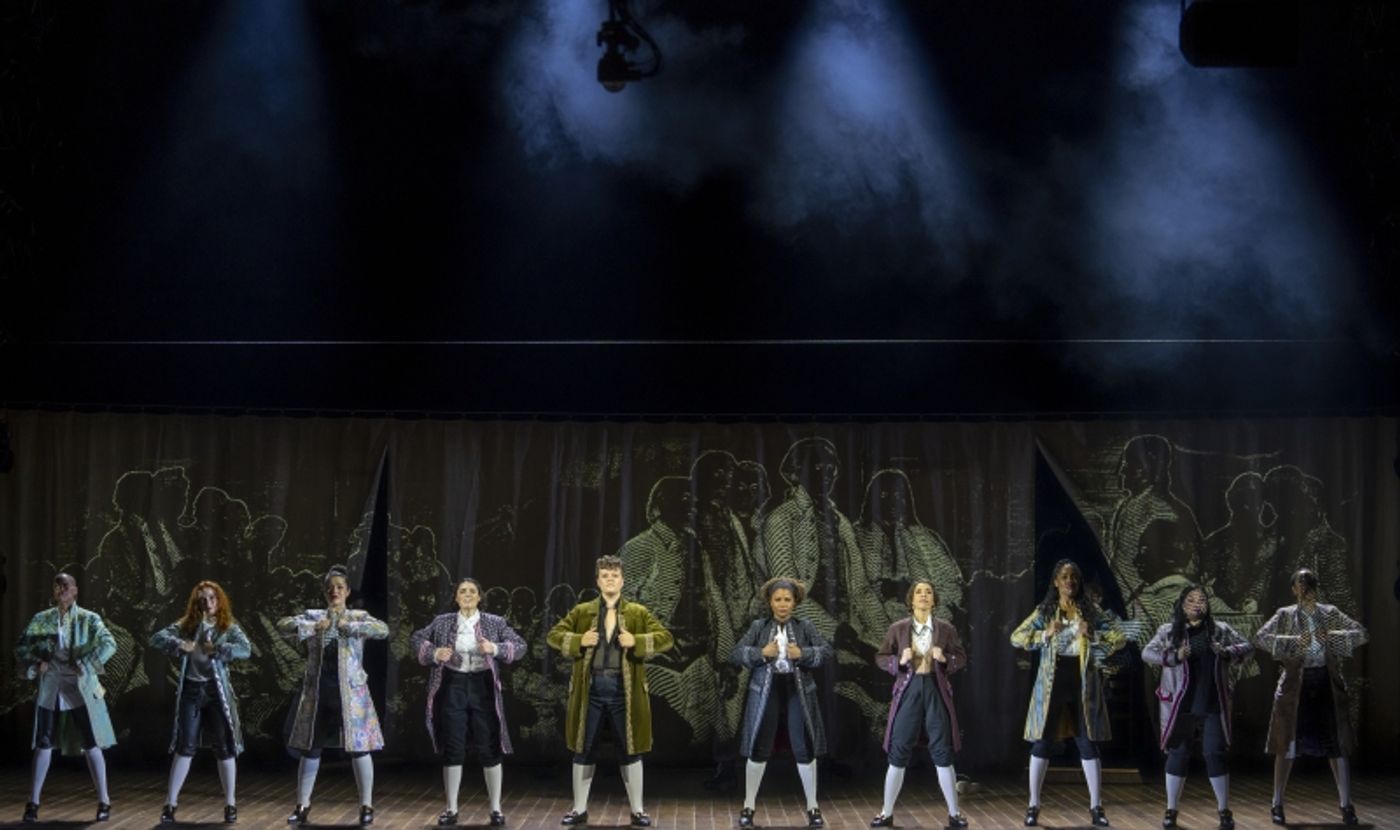 Joanna Glushak creates a memorable impression as John Dickinson, the sole holdout among the Congress members to refuse to sign the Declaration, and Oneika Phillips is a standout as John Hancock. The aforementioned Brooke Simpson is superb as The Courier and Kassandra Haddock cuts a rather dashing, if unsettling, figure as South Carolina’s Edward Rutledge.
Joanna Glushak creates a memorable impression as John Dickinson, the sole holdout among the Congress members to refuse to sign the Declaration, and Oneika Phillips is a standout as John Hancock. The aforementioned Brooke Simpson is superb as The Courier and Kassandra Haddock cuts a rather dashing, if unsettling, figure as South Carolina’s Edward Rutledge.
Shawna Hamic (whom last we saw on the Jackson Hall stage in 2011’s Les Miserables – which also featured Funny Girl's Julie Benko as Cosette – as the scene-stealing Madame Thenardier) continues to show off her considerable stage presence as Richard Henry Lee of the Virginia Lees to deliver the infectiously witty and fun “The Lees of Virginia” with enviable style.
Scott Pask’s scenic design provides the ideal physical trappings for the musical, gorgeously illuminated by Jen Schriever’s lighting design. Emilio Sosa designs the period-perfect frock coats and other articles of clothing that clothe the ensemble with an authentic sensibility that allows them to more easily become their assigned characters.
1776. Music and lyrics by Sherman Edwards. Book by Peter Stone. Based on a concept by Sherman Edwards. Directed by Jeffrey L. Page and Diane Paulus. Presented by Broadway at TPAC. At Tennessee Performing Arts Center’s Andrew Jackson Hall. Through Sunday, June 25. For details, go to www.TPAC.org. Running time: 2 hours, 38 minutes, with one 15-minute intermission.
Photo Credit: Joan Marcus

